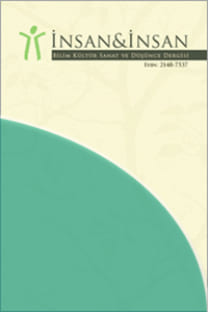Gelecek Olan Halk ya da Toplum 5.0: Hakikati Araştırma ve Masal Yaratma İlişkisi Bağlamında Toplumu Koruma Fikri
Gelecek olan halk, Toplum 5.0, Hakikati araştırmak, Masal yaratmak, Sosyal koruma
People to Come or Society 5.0: The Idea of Protecting Society in the Context of the Relationship between Searching for Truth and Fabulation
People to come, Society 5.0, Searching for truth, Fabulation, Social protection,
___
- Abood, Dave, Aidan Quilligan, Raghav Narsalay ve Vincent Cabanel. “Combine and Conquer: Unlocking the Power of Digital”. Accenture Research. (2018): 1-20.
- Bergson, Henri. Ahlakın ve Dinin İki Kaynağı. Çev., M. Mukadder Yakupoğlu. Ankara: Doğu Batı Yayınları, 2013.
- Berry, Albert. “Growth, Employment, Poverty and Social Protection: A Conceptual Framework”. Social Protection, Growth and Employment: Evidence from India, Kenya, Malawi, Mexico and Tajikistan. Der., United Nations Development Programme. New York: UNDP, 2013: 1-39.
- Bogue, Ronald. “Fabulation, Narration and the People to Come”. Deleuze and Philosophy. Der., Constantin V. Boundas. Edinburgh: Edinburgh University Press, 2006: 202-223.
- Council for Science, Technology and Innovation, Cabinet Office, Government of Japan. “Report on the 5th Science and Technology Basic Plan”. Erişim 12 Mart, 2021. https://www8.cao.go.jp/cstp/kihonkeikaku/5basicplan_en.pdf.
- Deleuze, Gilles ve Felix Guattari. Felsefe Nedir?. Çev., Turan Ilgaz. İstanbul: Yapı Kredi Yayınları, 2000.
- Deleuze, Gilles. “Edebiyat ve Yaşam”, Kritik ve Klinik. Çev., İnci Uysal. İstanbul: Norgunk Yayıncılık, 2013.
- Deleuze, Gilles. “Denetim ve Oluş”, Müzakereler. Çev., İnci Uysal. İstanbul: Norgunk Yayıncılık, 2013.
- Encyclopaedia Britannica. “Systems Biology” maddesi. Erişim 25 Mart, 2021, https://www.britannica.com/science/systems-biology.
- Foucault, Michel. Toplumu Savunmak Gerekir. Çev., Şehsuvar Aktaş. İstanbul: Yapı Kredi Yayınları, 2002.
- Foucault, Michel. “Hakikat ve Hukuksal Biçimler”, Büyük Kapatılma, Seçme Yazılar 3. Der., Işık Ergüden ve Tuncay Birkan. Çev., Işık Ergüden. İstanbul: Ayrıntı Yayınları, 2011.
- Foucault, Michel. “Dışarı Düşüncesi”, Sonsuza Giden Dil, Seçme Yazılar 6. Der., Işık Ergüden ve Tuncay Birkan. Çev., Işık Ergüden. İstanbul: Ayrıntı Yayınları, 2014.
- Fukuda, Kayano. “Science, Technology and Innovation Ecosystem Transfor-mation Toward Society 5.0”. International Journal of Production Economics. 220 (2020).
- Fukuyama, Mayumi. “Society 5.0: Aiming for a New Human-Centered Society”. Japan Spotlight. 37/4 (2018): 47-50.
- Garrett, Paul Michael. Dissenting Social Work: Critical Theory, Resistance and Pandemic. Oxfordshire: Routledge, 2021.
- Gürkan, Ceyhun. “Foucault, Public Finance, and Neoliberal Governmentality: A Critical Sociological Analysis”. Yönetim ve Ekonomi. 25/3 (2018): 677−694.
- Hardt, Michael. “Sivil Toplumun Çözülüşü”. Gilles Deleuze’de Toplum ve Denetim. Der. ve çev., Barış Başaran. İstanbul: Bağlam Yayınları, 2005.
- Hardt, Michael ve Antonio Negri. Duyuru. Çev., Abdullah Yılmaz, İstanbul: Ayrıntı Yayınları, 2012.
- Keidanren Japan Business Federation. “Toward Realization of the New Economy and Society: Reform of the Economy and Society by the Deepening of Society 5.0”. Erişim 12 Mart, 2021, https://www.keidanren.or.jp/en/policy/2016/029_outline.pdf.
- Kum, Hakan ve Özlem Öktem. “Düşük Gelirli Ülkelerde Sosyal Koruma ve Ekonomik Büyüme İlişkisi”. Ekonomi, Politika & Finans Araştırmaları Dergisi. 3/3 (2018): 335-344.
- Lazzarato, Maurizio. Signs and Machines: Capitalism and The Production of Subjectivity. Çev., Joshua David Jordan. Los Angeles: Semiotext(e), 2014.
- Lemke, Thomas. Biyopolitika. Çev., Utku Özmakas. İstanbul: İletişim Yayınları, 2013.
- Lyotard, Jean-François. Postmodern Durum: Bilgi Üzerine Bir Rapor. Çev., Ahmet Çiğdem. Ankara: Vadi Yayınları, 1997.
- McKee, Kim. “Post-Foucauldian Governmentality: What does It Offer Critical Social Policy Analysis?”. Critical Social Policy. 29/3 (2009): 465-486.
- Sarıipek, Doğa Başar. “ “Hak Temelli” Sosyal Politikadan “Hayırseverlik Temelli” Sosyal Politikaya Geçişte Sivil Toplum Örgütlerinin Rolü “. İnsan ve İnsan Dergisi. 11 (2017): 81-99.
- Serpa, Sandro ve Carlos Miguel Ferreira. “Society 5.0 and Sustainability Digital Innovations: A Social Process”. Journal of Organizational Culture, Communications and Conflict. 23/1 (2019): 1–14.
- Speeches and Statements by the Prime Minister Shinzo Abe. “CeBIT Welcome Night”. Erişim 12 Mart, 2021. https://japan.kantei.go.jp/97_abe/statement/201703/1221682_11573.html.
- The Government of Japan. “Realizing Society 5.0”. Erişim 12 Mart, 2021. https://www.japan.go.jp/abenomics/_userdata/abenomics/pdf/society_5.0.pdf.
- Yılmaz, Selman. Makro Ekonomik Teoride Yatırım, Büyüme ve Enflasyon. İstanbul: Beşir Kitabevi, 2004.
- Yayın Aralığı: Yılda 2 Sayı
- Başlangıç: 2014
- Yayıncı: Okur Yazar Derneği
Sosyal Korumada Küresel Boyutlar: Sorunlar ve Temel Tartışmalar
Covid-19 Pandemisinin Toplum 5.0'da Organize Suç Faaliyetlerine Etkisi
Nasıl Bir Gelecek? Küresel Bağlamda Romanya İş Hukukunun Dönüşümü
Covid-19 Pandemisinin Toplum 5.0'da Organize Suç Faaliyetlerine Etkisi
Covid-19 Gölgesinde Çalışmanın Geleceği Tartışmaları ve Avrupa Birliği'nde Kamusal Sosyal Harcamalar
Dijitalleşme Çağında İşyerinin Değişimi: Sebepleri ve Sonuçları
Gelecek Ne Getirecek? Toplum 5.0 Kapsamında Çalışma, Dijitalleşme ve Sosyal Koruma
Danijela BAGARİC, Valentina FRANCA
Covid-19 Gölgesinde Çalışmanın Geleceği Tartışmaları ve Avrupa Birliği'nde Kamusal Sosyal Harcamalar
Avrupa ve Asya Açısından İş Hukuku İlişkilerinde Yapay Zekânın Rolü
Gábor MÉLYPTAKI, Zsófia RİCZU, Dávid MÁTÉ, Panggih Kusuma NİNGRUM
